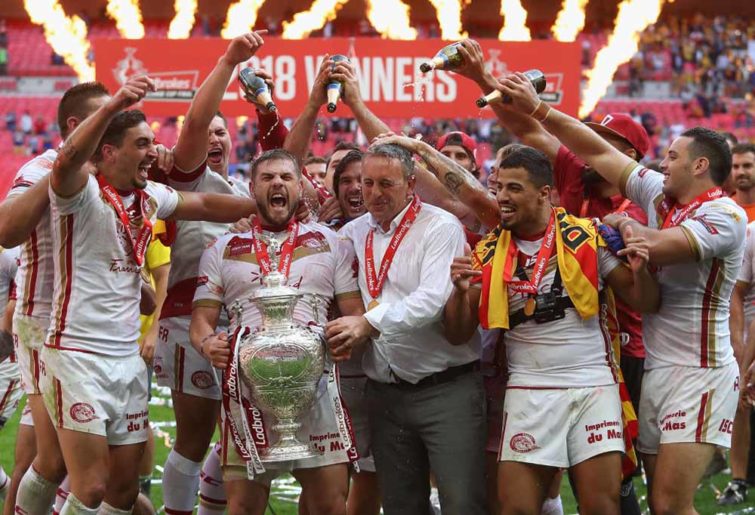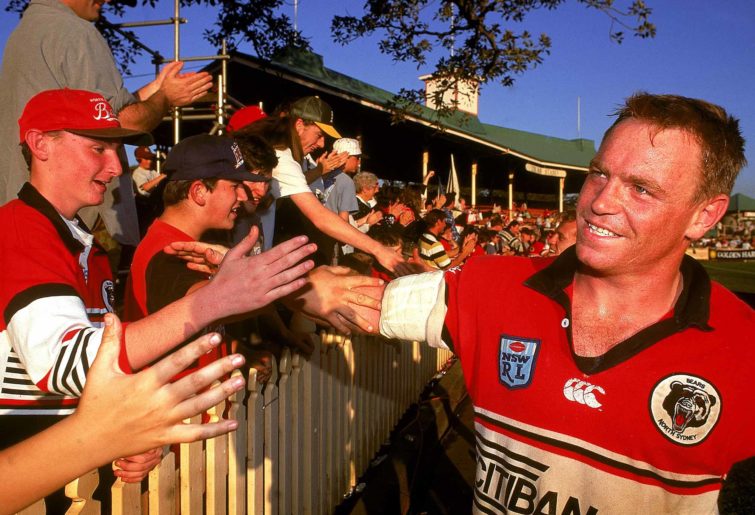Chooks stun THEMSELVES after containing entire Dragons set inside 10m line, scoring ridiculous try
The Roosters won 60-18 with this incredible sequence capping off the performance.
In 2019, the tectonic plates of rugby league are grinding against each other. Perhaps it should result in the creation of a new landmass?
In Australia, an evolutionary process which was frozen by the future shock of the Super League War more than 20 years ago is finally showing signs of picking up where Ken Arthurson and John Quayle left off that momentous Sunday morning of March 12, 1995.
On the day of the Western Reds’ first game, at Kings Park overlooking the city, they were forced to answer questions about rumours of a Super League that had broken in the Sydney press that morning.
The ARL chairman and chief executive had admitted four new teams and were prepared to let the existing teams in Sydney sink or swim.
But the rivers of cash invested in the game by a battle over the introduction of pay TV put everything out of whack. When News got their TV rights and the competition was stuck back together, everyone was so preoccupied with winning back existing fans that they daren’t suggest anything new and radical.
A generation-long coma now appears to be drawing to a close though; the people who snickered at the word ‘vision’ are not involved in the sport anymore.
We’re back where we were before Michael O’Connor climbed through that window in Townsville to sign players.
In Britain, the shock of the new is more recent. Expansion for Super League has not opened up new territories for television or sponsorship.
The loss of an estimated £800,000 because Catalans made (and then won) last year’s Challenge Cup final has the existing clubs along the M62 motorway panicking at the possibility of next year’s competition involving London, Catalans and Toronto.

Catalans Dragons celebrate (Photo by Christopher Lee/Getty Images)
And the idea of Ottawa and New York being admitted to the lower divisions, giving them a shot at the top tier too, is even more horrifying to some.
Their TV deal is up soon and not guaranteed to be renewed at all. As there is no TV money from France or Canada, many English clubs can only see disaster at what the expansionists are excited about.
Expansion isn’t good if you’re not set up to gain any advantage. Super League isn’t. If you’ve no TV money and fewer away fans, you’re stuffed.
The crucial error was not insisting that Toronto owner David Argyle take a cut of their TV money from the get-go – that way, they would have all got an even split of future North American rights, the way the NRL gets all the money from Sky New Zealand and the Warriors just get the same share as everyone else.
But that would require some foresight and a sport that isn’t keeping the debt collector at bay on an hourly basis.
New York and Ottawa are exciting for rugby league but are they exciting for the owners of League 1 clubs who will decide their fate? Part-timers required to take half a week off work, perhaps not get their visas in time, and get flogged by full-time squads full of former NRL players?
Likewise, Super League clubs who fear a Toronto team that will be great on the field next year but bring no fans can simply make ridiculous demands of the Wolfpack in exchange for admission to their competition next year.
Don’t drop your partner; treat them so badly they drop you.
We already know that works: ask them for £500,000 to compete in the Challenge Cup, they’ll refuse to pay and you can kick them out. So in 2020, business class airfares? Four nights in five-star accommodation? Even deep pockets aren’t bottomless.
Super League could just as easily go back into its shell over the next few years as spread its wings.
In fact, a dispassionate assessment of the situation would indicate the tortoise impersonation is more likely, given the clubs are running things and clubs always act in self-interest.
What then? What if we are left with Toronto and New York and Ottawa and Manchester Rangers and… Let’s throw in West Coast Pirates, North Sydney Bears, and switch to fish too big for their local pond, like Red Star Belgrade and Toulouse if they are also treated shoddily in a ‘SLexit’. Amsterdam Cobras have these sorts of ambitions too.

Bring back the Bears? (Photo by Getty Images)
The game should take a leaf out of two books: rugby union’s proposed World League and cricket’s IPL.
Put these teams in a six-week league that runs during the NRL and Super League pre-seasons. It would sit, structurally, above Super League and the NRL. The standard would be much lower but if it’s competitive, that wouldn’t matter.
Yes, it’s cold in America at that time of year. But the RLIF could run this without stepping on anyone’s toes. The teams could still go back and play in their domestic competitions afterwards but we would have a new property that could be sold to TV, private promoters and sponsors like the IPL.
Gradually, the number of North American teams could increase and other overseas sides would drop out. It would move to later in the year, and eventually become that American league we’ve been trying to run for decades.
These clubs have shown a willingness to do things out of the box. Their wages bills would be much, much lower than a full-time pro team due to the shortened season, and it could be done right through the front door of the game’s international governing body.
People with money want to put it into our sport. Just because our domestic competitions are two riven with self-interest and cursed by history doesn’t mean we shouldn’t find a way to take that money.